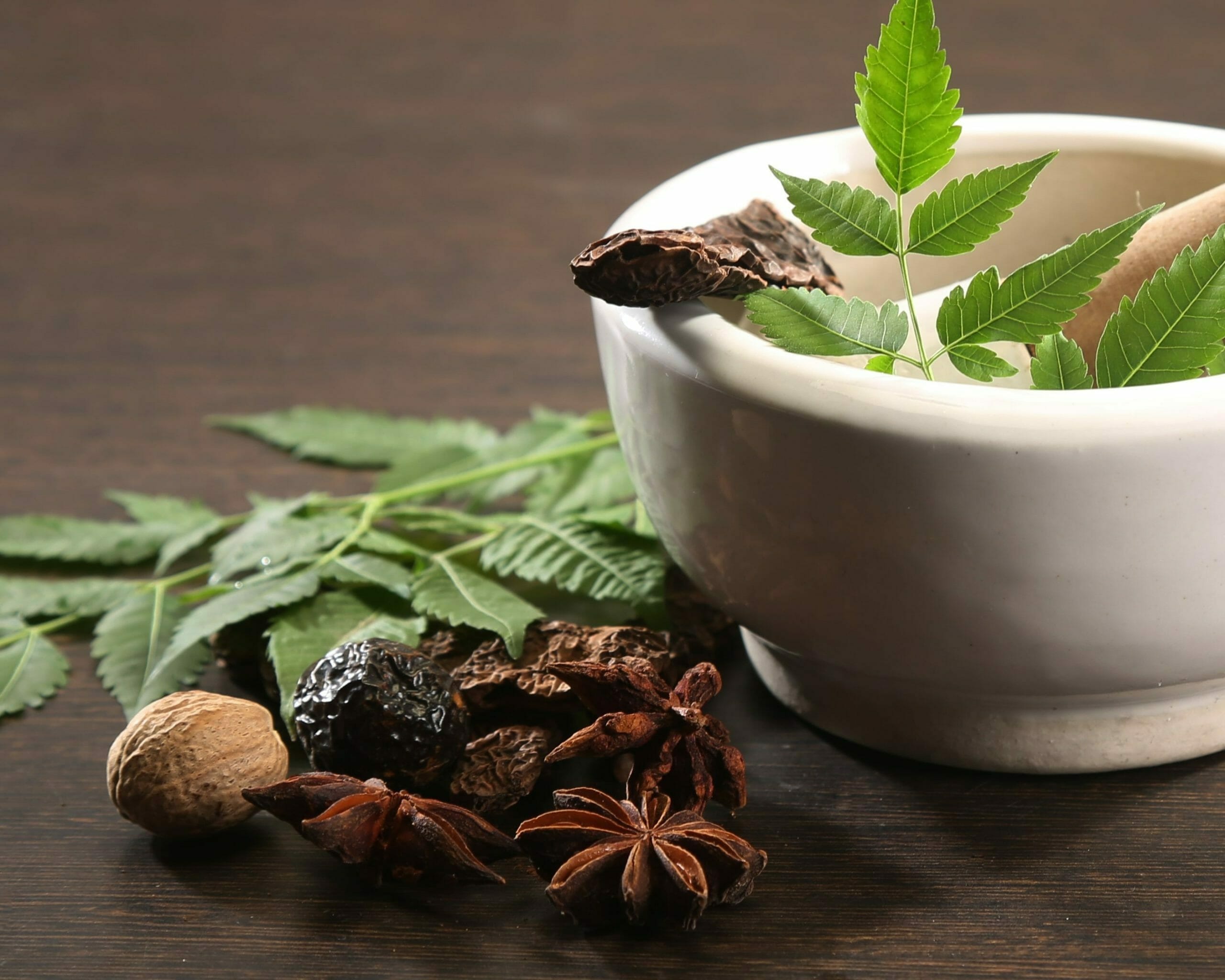While the pharmaceutical industrial complex continues to dump waste materials into our water and foods that cause drug resistant diseases, we are fortunate to still have the knowledge of ancient herbs and remedies from Ayurveda that can be used with few to no side effects.
By Maureen Sutton, LMT, RYT, AyuD
Ayurvedic herbs either alone as single herbs or as a synergistic blend have been used for thousands of years with excellent results and very few to no side effects. Ayurveda prescribes certain combinations of drugs to facilitate the delivery of the drugs to targeted sites of action while balancing the rest of the tissues. Unfortunately, in modern medicine, drugs may be targeted to particular sites of action but cause destruction at other sites. As with all medicines, herbs should be prescribed by an experienced Ayurvedic doctor.
Tulsi (Ocimum sanctum) or Holy Basil is a member of the Labiatae plant family. In the eyes of the Hindus, Tulsi is one of their most sacred plants, described as a devi, goddess or angel. Tulsi can be used as tea, churna (powder) or tincture.1
Bibhitaki (Terminalia bellirica) (Valsaraj et al; 1994) has shown significant activity against both gram positive and gram negative bacteria as well as antifungal activity. Best as a churna (powder) in combination with other herbs such as amla.1
White Mustard Seeds (Sinapis alba) were the subject of a study in Scholars Journal of Applied Medical Sciences in 2013. Their findings are as follows:
“The present investigation shows the Sinapis alba plant seeds had high antimicrobial activity of comparing other medicinal plants. So, it was considered that Sinapis alba seeds had medicinal values and some biological activities of hexane extract. The different concentration of hexane extract Sinapis alba has been demonstrated for the first time…”2
Sappan Wood (Caesalpinia sappan) or Brazil wood is an antimicrobial. It has been shown in studies that the aqueous extract has antimicrobial activity against methicillin-sensitive S. aureus (MSSA) as well as MRSA and may have the potential to restore the effectiveness of B-lactam antibiotics against MRSA. It is given as a decoction, powder or tincture.
Contraindication: Sappan Wood should not be given to pregnant or breast-feeding women or patients diagnosed with blood deficiency.1
Gandhak Rasayan tablets are prepared from a very potent natural ingredient which, in Ayurveda, is widely known for its usefulness. This ingredient is ‘Pure Gandhak’ (Purified Sulphur). The use of Gandhak Rasysan tablets is beneficial for individuals suffering from MRSA infections because these tablets can purify the blood, strengthen the immune system of the body, fight bacterial infections, and effectively manage skin problems.
The recommended dosage of Gandhak Rasayan tablets for the management of MRSA infections is: Two tablets, twice a day.
Kaishore Guggulu tablets are prepared from a blend of 11 powerful herbs which include: Guggul (Commniphora mukul), Guduchi (Tinospora cordifolia), Amalaki (Emblica officinalis), Haritaki (Terminalia chebula), Bibhitaki (Terminalia bellirica), Ginger (Zingiber officinale), Vidanga (Embelia ribes), Black pepper (Piper nigrum), Long pepper (Piper longum), Indian jalap (Ipomoea turpethum) and Red Physic nut (Baliospermum montanum).
These tablets are beneficial for managing bacterial infections, boosting the immune system, and treating different kinds of skin conditions. The recommended dosage for the management of MRSA infections is: Two tablets, two times a day.
Time Tested and Proven
While the pharmaceutical industrial complex continues to dump waste materials into our water and foods that cause drug resistant diseases, we are fortunate to still have the knowledge of ancient herbs and remedies from Ayurveda that can be used with few to no side effects. In fact, these ancient remedies have many side benefits because of the synergy of herbs used in combination. Thus, imparting a balancing effect on the whole body. These remedies are time tested over thousands of years and proven safe and effective.
If any drug resistance exists in Ayurvedic medicine, it is only due to the prolonged use of the drug. It may lose its efficacy in the body after 3-4 months of continuous use. In which case, the Ayurvedic doctor can change his/her choice of drugs and come back to the original formula a few months later. In fact, there is no such thing as drugs that cause resistant bacteria in Ayurveda.
It is time that we learn all we can from these remedies or suffer the consequences of exponential magnitude from microbial resistance caused by the western pharmaceutical drugs.
Furthermore, we must ensure that these Ayurvedic remedies are protected and the herbs kept pristine, grown without the use of pesticides, herbicides and heavy metals. Overuse of these herbs can cause a worldwide shortage and possible extinction. We must ensure that these herbs continue to be sustainable and accessible in the marketplace to protect ourselves from epidemic disasters now and for future generations to come.
References:
- Journey into Significance – History or Ayurveda and Nighantu – Ayurvedic Herbology, 2017-2018, Dr. Bharat Vaidya
- Scholars Journal of Applied Medical Sciences (SJAMS) ISSN 2320-6691 Sch. J. App. Med. Sci., 2013; 1(3):138-141 ©Scholars Academic and Scientific Publisher (An International Publisher for Academic and Scientific Resources) www.saspublisher.com 138 Research Article Preliminary Phytochemical Investigation and Antimicrobial Activity of Sinapis Alba Sujatha1 , Ravishankar1 , Mariajancyrani2*, Chandramohan2 1Department of chemistry, Rajah Serfoji Govt. College (Autonomous), Thanjavur-613 005, Tamil Nadu, India. 2Department of chemistry, A.V.V.M. Sri Pushpam College, Poondi, Thanjavur-613 503, Tamil Nadu, India. Corresponding author J.Mariajancyrani
Please connect with us if you have any questions about this recipe at info@ayurvedsadhana.com
Ayurved Sadhana will continue adding more blogs, herbs, health tips and recipes through Facebook and Newsletter. If you have any questions, please send email to info@ayurvedsadhana.com
All rights reserved by Ayurved Sadhana Vidyalaya and Maureen Sutton. Do not distribute or publish this material.

